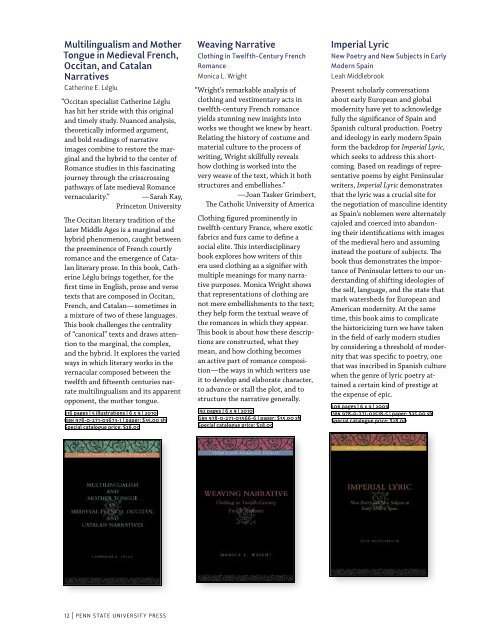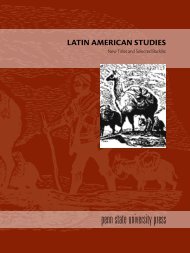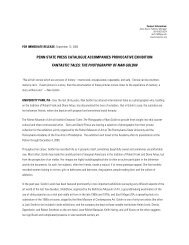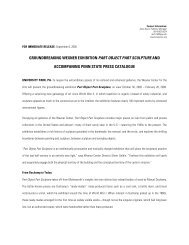Download the Catalog (PDF) - Pennsylvania State University Press
Download the Catalog (PDF) - Pennsylvania State University Press
Download the Catalog (PDF) - Pennsylvania State University Press
You also want an ePaper? Increase the reach of your titles
YUMPU automatically turns print PDFs into web optimized ePapers that Google loves.
Multilingualism and Mo<strong>the</strong>r<br />
Tongue in Medieval French,<br />
Occitan, and Catalan<br />
Narratives<br />
Ca<strong>the</strong>rine E. Léglu<br />
“Occitan specialist Ca<strong>the</strong>rine Léglu<br />
has hit her stride with this original<br />
and timely study. Nuanced analysis,<br />
<strong>the</strong>oretically informed argument,<br />
and bold readings of narrative<br />
images combine to restore <strong>the</strong> marginal<br />
and <strong>the</strong> hybrid to <strong>the</strong> center of<br />
Romance studies in this fascinating<br />
journey through <strong>the</strong> crisscrossing<br />
pathways of late medieval Romance<br />
vernacularity.” —Sarah Kay,<br />
<br />
Princeton <strong>University</strong><br />
The Occitan literary tradition of <strong>the</strong><br />
later Middle Ages is a marginal and<br />
hybrid phenomenon, caught between<br />
<strong>the</strong> preeminence of French courtly<br />
romance and <strong>the</strong> emergence of Catalan<br />
literary prose. In this book, Ca<strong>the</strong>rine<br />
Léglu brings toge<strong>the</strong>r, for <strong>the</strong><br />
first time in English, prose and verse<br />
texts that are composed in Occitan,<br />
French, and Catalan—sometimes in<br />
a mixture of two of <strong>the</strong>se languages.<br />
This book challenges <strong>the</strong> centrality<br />
of “canonical” texts and draws attention<br />
to <strong>the</strong> marginal, <strong>the</strong> complex,<br />
and <strong>the</strong> hybrid. It explores <strong>the</strong> varied<br />
ways in which literary works in <strong>the</strong><br />
vernacular composed between <strong>the</strong><br />
twelfth and fifteenth centuries narrate<br />
multilingualism and its apparent<br />
opponent, <strong>the</strong> mo<strong>the</strong>r tongue.<br />
216 pages | 5 illustrations | 6 x 9 | 2010<br />
isbn 978-0-271-03673-1 | paper: $35.00 sh<br />
Special catalogue price: $28.00<br />
Weaving Narrative<br />
Clothing in Twelfth-Century French<br />
Romance<br />
Monica L. Wright<br />
“Wright’s remarkable analysis of<br />
clothing and vestimentary acts in<br />
twelfth-century French romance<br />
yields stunning new insights into<br />
works we thought we knew by heart.<br />
Relating <strong>the</strong> history of costume and<br />
material culture to <strong>the</strong> process of<br />
writing, Wright skillfully reveals<br />
how clothing is worked into <strong>the</strong><br />
very weave of <strong>the</strong> text, which it both<br />
structures and embellishes.”<br />
<br />
—Joan Tasker Grimbert,<br />
The Catholic <strong>University</strong> of America<br />
Clothing figured prominently in<br />
twelfth-century France, where exotic<br />
fabrics and furs came to define a<br />
social elite. This interdisciplinary<br />
book explores how writers of this<br />
era used clothing as a signifier with<br />
multiple meanings for many narrative<br />
purposes. Monica Wright shows<br />
that representations of clothing are<br />
not mere embellishments to <strong>the</strong> text;<br />
<strong>the</strong>y help form <strong>the</strong> textual weave of<br />
<strong>the</strong> romances in which <strong>the</strong>y appear.<br />
This book is about how <strong>the</strong>se descriptions<br />
are constructed, what <strong>the</strong>y<br />
mean, and how clothing becomes<br />
an active part of romance composition—<strong>the</strong><br />
ways in which writers use<br />
it to develop and elaborate character,<br />
to advance or stall <strong>the</strong> plot, and to<br />
structure <strong>the</strong> narrative generally.<br />
192 pages | 6 x 9 | 2010<br />
isbn 978-0-271-03566-6 | paper: $35.00 sh<br />
Special catalogue price: $28.00<br />
Imperial Lyric<br />
New Poetry and New Subjects in Early<br />
Modern Spain<br />
Leah Middlebrook<br />
Present scholarly conversations<br />
about early European and global<br />
modernity have yet to acknowledge<br />
fully <strong>the</strong> significance of Spain and<br />
Spanish cultural production. Poetry<br />
and ideology in early modern Spain<br />
form <strong>the</strong> backdrop for Imperial Lyric,<br />
which seeks to address this shortcoming.<br />
Based on readings of representative<br />
poems by eight Peninsular<br />
writers, Imperial Lyric demonstrates<br />
that <strong>the</strong> lyric was a crucial site for<br />
<strong>the</strong> negotiation of masculine identity<br />
as Spain’s noblemen were alternately<br />
cajoled and coerced into abandoning<br />
<strong>the</strong>ir identifications with images<br />
of <strong>the</strong> medieval hero and assuming<br />
instead <strong>the</strong> posture of subjects. The<br />
book thus demonstrates <strong>the</strong> importance<br />
of Peninsular letters to our understanding<br />
of shifting ideologies of<br />
<strong>the</strong> self, language, and <strong>the</strong> state that<br />
mark watersheds for European and<br />
American modernity. At <strong>the</strong> same<br />
time, this book aims to complicate<br />
<strong>the</strong> historicizing turn we have taken<br />
in <strong>the</strong> field of early modern studies<br />
by considering a threshold of modernity<br />
that was specific to poetry, one<br />
that was inscribed in Spanish culture<br />
when <strong>the</strong> genre of lyric poetry attained<br />
a certain kind of prestige at<br />
<strong>the</strong> expense of epic.<br />
206 pages | 6 x 9 | 2009<br />
isbn 978-0-271-03518-5 | paper: $35.00 sh<br />
Special catalogue price: $28.00<br />
12 | penn state university press
















